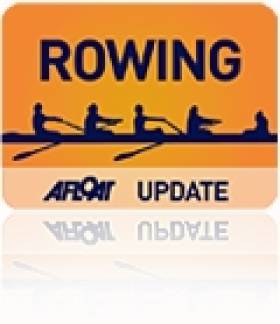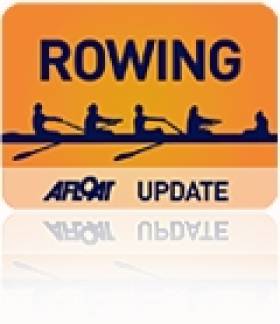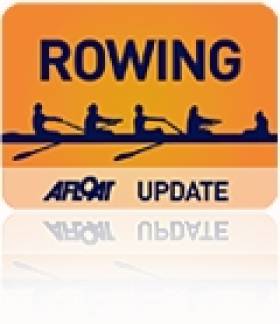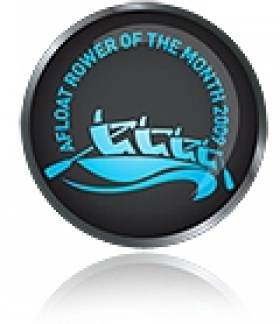Displaying items by tag: Siobhan McCrohan
McCrohan Adds to Ireland Rowing Medal Tally in Italy
#ROWING – Siobhán McCrohan took silver for Ireland in the lightweight single sculls at the Memorial Paolo d'Aloja in Piediluco in Italy this morning. The 27-year-old from Galway finished less than a second behind gold medallist Kat Johnstone of South Africa, improving on both her time and her fourth position in Saturday's final.
Memorial Paolo d'Aloja Regatta, Piediluco, (A Finals unless stated; Irish interest)
Saturday
Women
Pair: 1 Ireland (L Kennedy, M Dukarska) 7:35.74, 2 Spain 7:37.11, 3 Italy Two 7:38.79.
Lightweight Double Sculls: 1 South Africa 7:11.05, 2 Italy 7:17.41, 3 Ireland (C Lambe, D Walsh) 7:18.97.
Single Sculls: 1 Switzerland (J Gmelin) 7:56.63, 2 Greece Two (A Asoumanaki) 7:57.42, 3 Zimbabwe (M Thornycroft) 7:58.40; 4 Ireland (S Puspure) 8:01.67.
Lightweight Single Sculls: 1 Switzerland (P Merz) 7:46.88, 2 South Africa (K Johnstone) 7:49.80, 3 Switzerland Two (R Frederique) 7:20.25; 4 Ireland (S McCrohan) 7:50.35.
Saturday Heats
Men
Lightweight Double – Heat Three: 1 South Africa 6:24.87, 2 Greece 6:25.40, 3 Ireland (P O'Donovan, G O'Donovan) 6:26.49
Women
Lightweight Single Scull – Heat One: 2 McCrohan 8:17.38.
Sunday – Finals
Women
Pair: 1 Ireland (Kennedy, Dukarska) 7:31.65, 2 Spain 7:32.49, 3 Italy Two 7:35.41.
Double Sculls: 1 Lithuania (D Vistartaite, M Valciukaite) 7:01.59; 5 Ireland (Lambe, Walsh) 7:26.33.
Lightweight Single Sculls: 1 South Africa (K Johnstone) 7:47.94, 2 Ireland (McCrohan) 7:48.80, 3 Italy (BL Pelloni) 7:54.66.
Ireland Rowers O'Donovan, McCrohan and Puspure Excel in Trial
#ROWING: On a day with a spread of excellent performances, Paul O’Donovan, Siobhán McCrohan and Sanita Puspure topped the rankings in their classes at the Ireland trial on Newry Canal. O’Donovan, a 19-year-old lightweight sculler, was the fastest man on the day. He clocked 19 minutes 5.46 seconds for the five kilometres, which made him the fourth fastest crew, only bettered by three heavyweight pairs.
McCrohan’s return was also remarkable. The Galway lightweight, who was cut by the previous Ireland coaching regime, shaded O’Donovan in terms of per centage of projected world gold medal time, with a superb 87.43 per cent. Puspure, a heavyweight sculler who had a 2013 to forget because of injury, also excelled, with 86.99 per cent despite a brush with a tree and hitting a buoy in the headwind conditions.
Both men’s and women’s lightweight classes could boast a depth in good performances: Catríona Jennings, a former Olympian marathon runner who is new to rowing, reaced 86.26 of projected world best time as a lightweight sculler. Heavyweight sculler Monika Dukarska also performed well in finishing second to Puspure.
Ireland Trial, Newry, Saturday (Run over 5km; Selected Results)
(Percentage is of projected world gold medal winning time)
Men
Pair – Senior: 1 D Neale, C Folan 18 minutes 41.53 seconds (82.03), 2 D Power, P O’Connell 18:53.62 (81.6). Under-23: 1 R O’Callaghan, R Bennett 18:29.53 (82.92), 2 M Pukelis, K Neville 19:23.43 (79.08). Junior: D Keohane, B Keohane 19:06.58 (80.24), 2 Murphy, O’Connell 19:26.23 (78.89), 3 Fallon, Bennett 19:32.47 (78.47).
Lightweight: 1 Quinlan, O’Connor 19:27.59 (81.36), 2 McKenna, Murphy 19:30.72 (81.15), 3 Keane, Breen 19:32.55 (81.02).
Sculling,
Single – Senior: 1 J Keohane 19:16.47 (84.31), 2 A McEvoy 19:37.34 (82.81). Under-23: 1 T Oliver 19.47.82 (82.08), 2 A Harrington 19:52.47 (81.76), 3 S McKeown 20:06.03 (80.84). Junior: 1 D O’Malley 19:41.55 (82.5), 2 C Carmody 19:57.29 (81.43), 3 C Hennessy 20:15.6 (80.21).
Lightweight – Senior: 1 N Kenny 19:18.40 (86.33), 2 J Ryan 19:28.13 (85.61), 3 M O’Donovan 19:30.07 (85.46). Under-23: P O’Donovan 19:05.46 (87.3), 2 S O’Driscoll 19:26.18 (85.75), 3 C Beck 19:41.35 (84.65).
Women
Four – Senior: Deasy, McCarthy, O’Brien, Leahy 19:51.76 (84.33).
Pair – Senior: L Dileen, A Keogh 20:12.32 (84.14), 2 Bennett, Gilligan 21:28.79 (79.14). Under-23: G Collins, O Finnegan 21.05.13 (80.62). Junior: 1 K O’Connor, H Hickey 21:43.08 (78.28), 2 Clarke, Glover 21:54.75 (77.58), 3 Nagle, O’Keeffe 22:33.06 (75.38).
Sculling
Single – Senior: 1 S Puspure 20:21.36 (86.99), 2 M Dukarska 2:40.57 (85.65), 3 E Moran 21:20.92. Under-23: 1 C Fitzgerald 21.50.12 (81.10), 2 H O’Sullivan 22:14.21 (79.64), 3 M Dineen 22:27.69 (78.84). Junior: 1 E Lambe 21:47.62 (81.25), 2 J English 21:54.17 (80.85), 3 E Barry 22:03.17 (80.30).
Lightweight – Senior: 1 S McCrohan 20:58.15 (87.43), 2 C Jennings 21:15.24 (86.26), 3 O Hayes 21:18.60 (86.03). Under-23: 1 R Morris 21:32.68 (85.09), 2 S Horgan 21:47.18 (84.15).
Two womens' boats will compete for Olympic qualification, another is seeking Paralympics qualification and two boats are entered in non-Olympic world championship events.
The boats with ambition for Olympic qualification are the lightweight double scull of Claire Lambe and Siobhan McCrohan and the openweight women's double scull of Sanita Puspure and Lisa Dilleen.
With lightweight double sculls being the only boat class for lightweight women, the entry of 26 boats will generate intense competition for the eight Olympic places on offer this year. Lambe and McCrohan, who came fourth at last year's European championships, will be competitive for one of these Olympic places, but it will be very tight with any mistakes or errors making a dramatic difference in final results.
Similarly the openweight women's double scull has eight Olympic places on offer with 19 entries. The newly formed double scull is a partnership between Dilleen, a 20 year old from Galway, who came fourth in the World Junior Rowing Championships two years ago; and Sanita Puspure, a recently naturalised Irish citizen from Latvia. In 2003, Puspure was a bronze medallist for Latvia at under 23 level. The Irish pair finished fifth at the first World Cup earlier this summer in Munich, followed by an eleventh place in Lucerne.
For the first time, Ireland has a boat attempting qualification for next year's London Paralympic games in the form of a mixed coxed four crew in the legs, trunk, and arms (LTA) category. There are 16 entries with 8 qualifying. Ireland's boat finished fifth at the 2010 World Rowing Championships, and whilst the number of entrants has increased this year, the crew have a good chance of making the first eight to qualify.
Performance director Martin McElroy, an Olympic gold medal winning coach with the British team at the Sydney Olympics in 2000, said today, "Only our adaptive athletes went to the 2010 World Rowing championships. For all the others competing, it's a first time experience, and in an Olympic qualification year that's a big ask."
"When I started in my role as performance director in 2009, I knew we were missing a generation of athletes. A look at the age demographic of our team confirms that. However I am very pleased that we have a young ambitious group of athletes who are willing to take it on and it is not beyond the bounds of possibility that one or more of the boats may qualify. It's a big ask but it's not impossible. Added to that, we have a Paralympic boat seeking qualification for the first time"
The men's lightweight quadruple scull contains the same line-up that won a silver medal at the 2010 World Under-23 Rowing Championships. A strategic decision was taken to favour the non-Olympic boat class for these young athletes in order to continue their international development.
Performance director, Martin McElroy explained, "The choice was to risk immersing these young athletes in the cauldron of Olympic lightweight class boats which are amongst the most competitive classes in the Olympic regatta and create a very negative experience early in their careers, or take a more measured approach to their development and transition to the senior level through the non-Olympic boat classes."
"It was clear to us that we did not have a boat that would be close to qualification at this time and we discussed this openly with the squad. With 34 entries and only 11 to qualify, I'm satisfied that we've taken the right decision. These young athletes can compete positively in the quadruple scull event and continue taking the steps necessary to transition successfully from under 23 to senior."
Sarah Dolan a 21-year old Trinity college engineering student races in the women's lightweight single scull, an event with 22 entries.
McCrohan is Afloat Rower of the Month (and podcast!)
Siobhan McCrohan is the Afloat Rower of the Month for April. The Galway woman was a convincing winner of the women’s single sculls final at the National Trials, following a similar win at the National Assessment in Newry. Last season she placed sixth at the World Cup regatta in Lucerne in a lightweight single scull, and partnered Claire Lambe in a lightweight double scull to sixth place at the World Cup in Bled and fourth at the European Championships in Portugal. Afloat wishes Siobhan and all the Ireland team well in the season ahead.
Rower of the Month awards: The judging panel is made up of Liam Gorman, rowing correspondent of The Irish Times, President of Rowing Ireland Anthony Dooley and David O'Brien, Editor of Afloat magazine. Monthly awards for achievements during the year will appear on afloat.ie and the overall national award will be presented to the person or crew who, in the judges' opinion, achieved the most notable results in, or made the most significant contribution to rowing during 2011. Keep a monthly eye on progress and watch our 2011 champions list grow.
































































